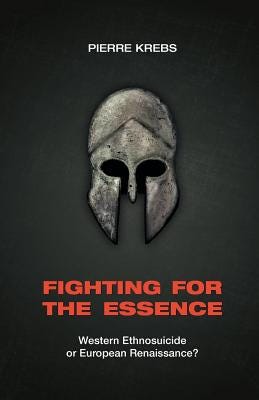Like a virus altering its host's DNA, Judaeo-Christian monotheism fundamentally corrupted European civilization - at least according to Pierre Krebs in his provocative work "Fighting for the Essence." Far from being Europe's foundation, Krebs argues that Christianity represents a spiritual colonization that replaced organic diversity with universal conformity, setting the stage for everything from modern globalization to multiculturalism. His analysis of paganism versus Christianity thus reaches far beyond ancient religious debates into the heart of contemporary European identity.
In Fighting for the Essence, Pierre Krebs presents a fundamental opposition between European paganism and Judaeo-Christianity that he sees as crucial to understanding both Europe's decline and potential renewal. For Krebs, this religious divide represents not merely theological differences but competing visions of humanity, nature, and culture that continue to shape contemporary political and social struggles.
At the heart of Krebs's critique is his view of Judaeo-Christian monotheism as the "matrix of the West" and the source of Europe's cultural and spiritual decline. Drawing on Nietzsche, who famously called Christianity "the one immortal blot on humanity" and "the anti-Aryan religion par excellence," Krebs argues that monotheism's universalist and egalitarian tendencies are fundamentally alien to authentic European identity.1 This alienation, he contends, manifests most dramatically in Christianity's separation of humanity from nature, exemplified in the Biblical command to "subdue" the earth. As he pointedly observes, "The God of the Bible has broken the nervous fibre that united man to the universe and to the elements."2
In contrast to this monotheistic alienation, Krebs celebrates what he terms the "authentic European culture" rooted in pre-Christian Indo-European paganism. This heritage, which he sees expressed in Greek, Roman, Germanic, Celtic, and Slavic variations, represents for him a fundamentally different way of understanding humanity's relationship to both nature and culture. Where Christianity imposes a universal model that transcends particular peoples and places, paganism grows organically from specific cultural and territorial roots. This pagan heritage, Krebs argues, has never been entirely extinguished despite centuries of Christian dominance. As he approvingly quotes Sigrid Hunke: "In Europe, there has always existed a non-dualist religion that has never faded away, even during the Christian phase of the West... This non-dualist religion has remained latent, and has torn away, here and there, the essentially artificial mask of Christianisation."3
Importantly, Krebs's vision of paganism is not simply nostalgic or reconstructionist. He explicitly states that "our approach to paganism was not born out of a wish for a nostalgic return to forbidden traditions...but, on the contrary, in the sense of a destined will called upon to recreate the mental and spiritual conditions that would permit the gods to reappear on the horizon of a new beginning."4 Drawing on Heidegger, he envisions a future-oriented paganism that might prepare the way for a new manifestation of the sacred appropriate to contemporary European identity.
Krebs sees a direct line connecting Christian universalism to modern ideologies of globalization and multiculturalism. For him, "the West is neither a people nor a culture. The West is only a system of civilization, the status quo of a mental and geographical occupation of the Earth."5 Modern notions of human rights, liberal democracy, and cultural homogenization are, in his view, secularized versions of Christian universalism. As he puts it, "the monotheistic 'Unique' and the egalitarian 'Same' are, in fact, the front and reverse side of the same coin of the same egalitarianism."6
The solution Krebs proposes is radical: a return to European pagan spiritual and cultural foundations as the basis for contemporary renewal. "Europe will be reborn from itself, 'from the re-appropriation of its own origins,' or it will not be reborn," he declares.7 This renewal must be both spiritual and political, requiring us to "return to the Church Fathers what accrues to them by right, and restore to Apollo, Caesar and Faust what originally belongs to them."8
Krebs's arguments raise profound questions about religious and cultural authenticity, the tension between universal and particular identities, and the relationship between spiritual and cultural renewal. While his stark opposition between European paganism and Judaeo-Christianity may oversimplify their complex historical interactions, his analysis highlights important questions about the religious and cultural foundations of contemporary European identity. His vision of a renewed European paganism, oriented toward the future rather than the past, offers a provocative perspective on the relationship between religious tradition and cultural renewal in the modern world.
For Krebs, the choice between paganism and Christianity is ultimately a choice between authentic European identity and alien universal abstractions, between organic cultural diversity and homogenizing globalization. Whether one accepts his analysis or not, his argument highlights the continuing importance of religious and cultural foundations in debates about European identity and future.
Krebs, Pierre. Fighting for the Essence. Arktos, 2012. p 40-41.
Ibid., p 44.
Ibid., p 37.
Ibid., p 75.
Ibid., p 41.
Ibid., p 22.
Ibid., p 90.
Ibid., p 41.







Fantastic work! I've greatly enjoyed this series as it echoes a lot of my own thoughts about Christianity.
In spiritual terms, it's an interesting time to be alive as we watch and wait to see which religions will revive/evolve and what new religions will emerge.